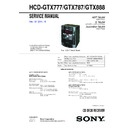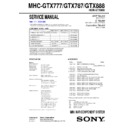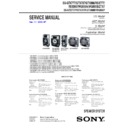Read Sony HCD-GTX777 / HCD-GTX888 / MHC-GTX777 / MHC-GTX888 Service Manual online
1
HCD-GTX777/GTX787/GTX888
Ver. 1.5 2011. 10
SERVICE MANUAL
AEP Model
HCD-GTX777
E Model
HCD-GTX777/GTX787/GTX888
Australian Model
HCD-GTX888
HCD-GTX777/GTX787/GTX888
AUDIO POWER SPECIFICATION
Amplifi er section
MHC-GTX888 (HCD-GTX888)
MHC-GTX888 (HCD-GTX888)
The following are measured at
Mexican model:
AC 127 V, 60 Hz
Other models:
AC 120, 220, 230 – 240 V, 50/60 Hz
Front/Surround speaker
Power Output (rated):
Power Output (rated):
190 W + 190 W (at 8
and 24 ,
1 kHz, 1% THD, at LINK MODE)
RMS output power (reference):
295 W + 295 W (per channel at 8
and
24
, 1 kHz, 10% THD, at LINK MODE)
Subwoofer
RMS output power (reference):
RMS output power (reference):
160 W + 160 W (per channel at 6
,
100 Hz, 10% THD)
SPECIFICATIONS
MHC-GTX787 (HCD-GTX787)
The following are measured at
Mexican model:
Mexican model:
AC 127 V, 60 Hz
Other models:
AC 120, 220, 230 – 240 V, 50/60 Hz
Front speaker
Power Output (rated):
Power Output (rated):
230 W + 230 W (at 4
, 1 kHz, 1% THD)
RMS output power (reference):
380 W + 380 W (per channel at 4
, 1 kHz, 10% THD)
MHC-GTX777 (HCD-GTX777)
European model only
The following are measured at
AC 230 V, 50/60 Hz
Front/Surround speaker
Power Output (rated):
Power Output (rated):
235 W + 235 W (at 8
and 8 , 1 kHz,
1% THD, at LINK MODE)
RMS output power (reference):
380 W + 380 W (per channel at 8
and
8
, 1 kHz, 10% THD, at LINK MODE)
Sony Corporation
Published by Sony EMCS (Malaysia) PG Tec
9-890-504-06
2011J08-1
© 2011. 10
– Continued on next page –
CD DECK RECEIVER
• HCD-GTX777/GTX787/GTX888
are the tuner, deck, CD and
amplifi er section in
MHC-GTX777/GTX787/GTX888.
are the tuner, deck, CD and
amplifi er section in
MHC-GTX777/GTX787/GTX888.
Model Name Using Similar Mechanism HCD-GTX66/GTX77/GTX88
CD
CD
Mechanism
Type
CDM74KF-K6BD93-WOD//M
Section
Optical Pick-up Name
KSM-213DCP/C2NP
Tape Deck Model Name Using Similar Mechanism NEW
Section
Tape Mechanism Type
CFP42608
Photo : HCD-GTX888 (E Model)
2
HCD-GTX777/GTX787/GTX888
SAFETY-RELATED COMPONENT WARNING!!
COMPONENTS IDENTIFIED BY MARK
0
OR DOTTED LINE
WITH MARK
0
ON THE SCHEMATIC DIAGRAMS AND IN THE
PARTS LIST ARE CRITICAL TO SAFE OPERATION. REPLACE
THESE COMPONENTS WITH SONY PARTS WHOSE PART
NUMBERS APPEAR AS SHOWN IN THIS MANUAL OR IN
SUPPLEMENTS PUBLISHED BY SONY.
THESE COMPONENTS WITH SONY PARTS WHOSE PART
NUMBERS APPEAR AS SHOWN IN THIS MANUAL OR IN
SUPPLEMENTS PUBLISHED BY SONY.
Other models
The following are measured at
AC 120, 220, 230 – 240 V, 50/60 Hz
Front/Surround speaker
Power Output (rated):
Power Output (rated):
235 W + 235 W (at 8
Ω and 8 Ω, 1 kHz,
1% THD, at LINK MODE)
RMS output power (reference):
380 W + 380 W (per channel at 8
Ω and
8
Ω, 1 kHz, 10% THD, at LINK MODE)
Inputs
VIDEO (AUDIO IN) L/R:
VIDEO (AUDIO IN) L/R:
Voltage 250 mV, impedance 47 kilohms
AUDIO INPUT L/R:
Voltage 450 mV, impedance 47 kilohms
MIC:
Sensitivity 1 mV, impedance 10 kilohms
(USB) port:
Type A
Outputs
PHONES:
PHONES:
accepts headphones of 8
Ω or more
Disc player section
System
Compact disc and digital audio system
Laser Semiconductor
laser
(
λ = 770 – 810 nm)
Emission duration: continuous
Laser Output
Max. 44.6 µW*
* This output is the value measured at
a distance of 200 mm from the
objective lens surface on the Optical
Pick-up Block with 7 mm aperture.
Frequency response
20 Hz – 20 kHz
Wave length
770 – 810 nm
Signal-to-noise ratio
More than 90 dB
Dynamic range
More than 88 dB
Tape deck section
Recording system
4-track 2-channel stereo
Frequency response
50 – 13,000 Hz (±3 dB),
using Sony TYPE I tape
Wow and fl utter
±0.35% W.Peak (IEC)
0.3%
W.RMS
(NAB)
±0.4%
W.Peak
(DIN)
Tuner section
FM stereo, FM/AM superheterodyne tuner
FM tuner section
Tuning range
Brazil model:
Brazil model:
87.5 – 108.0 MHz (100 kHz step)
Other models:
87.5 – 108.0 MHz (50 kHz step)
Antenna FM
lead
antenna
Antenna terminals
75 ohms unbalanced
Intermediate frequency 10.7 MHz
AM tuner section
Tuning range
Pan-American and Oceanian models:
530 – 1,710 kHz (with the interval set at 10 kHz)
531 – 1,710 kHz (with the interval set at 9 kHz)
European model:
531 – 1,602 kHz (with the interval set at 9 kHz)
Other models:
531 – 1,602 kHz (with the interval set at 9 kHz)
530 – 1,610 kHz (with the interval set at 10 kHz)
Antenna AM
loop
antenna
Antenna terminals
External antenna terminal
Intermediate frequency 450 kHz
USB section
Supported bit rate
MP3 (MPEG 1 Audio Layer 3): 32 – 320 kbps, VBR
WMA: 32 – 192 kbps, VBR AAC: 48 – 320 kbps
Sampling frequencies
MP3 (MPEG 1 Audio Layer 3): 32/44.1/48 kHz
WMA: 44.1 kHz, AAC: 44.1 kHz
Transfer speed
Full-Speed
Supported USB device Mass Storage Class
Maximum current
Maximum current
500 mA
General
Power requirements
European model:
European model:
230 V AC, 50/60 Hz
Mexican model:
127 V AC, 60 Hz
Oceanian model:
230 – 240 V AC, 50/60 Hz
Argentina models:
220 V AC, 50/60 Hz
Other models:
120 V, 220 V or 230 – 240 V AC, 50/60 Hz,
adjustable with voltage selector
Power consumption
MHC-GTX888: 430 W
MHC-GTX787/MHC-GTX777:
300
W
Dimensions (w/h/d) (Approx.)
HCD-GTX888/HCD-GTX787/
HCD-GTX777: 281 × 365 × 454 mm
(11 1/8 × 14 3/8 × 17 7/8 inches)
Mass (Approx.)
HCD-GTX888: 14.0 kg (30 lb 14 oz)
HCD-GTX787/HCD-GTX777:
12.0 kg (26 lb 8 oz)
Supplied accessories
Remote Commander (1)
R6 (size AA) batteries (2)
AM loop antenna (1)
FM lead antenna (1)
Front speaker pads (8)
Surround speaker pads
(MHC-GTX888/MHC-GTX777 only) (8)
Subwoofer pads (MHC-GTX888 only) (Black) (8)
Speaker cords (MHC-GTX787 only) (2)
Spacer A (MHC-GTX888 only) (2)
Spacer B (MHC-GTX888 only) (2)
Spacer C (MHC-GTX777 only) (2)
Audio cable (1) (Mexico only)
Design and specifi cations are subject to change without notice.
3
HCD-GTX777/GTX787/GTX888
CAUTION
Use of controls or adjustments or performance of procedures
other than those specifi ed herein may result in hazardous
radiation exposure.
other than those specifi ed herein may result in hazardous
radiation exposure.
NOTES ON HANDLING THE OPTICAL PICK-UP BLOCK
OR BASE UNIT
OR BASE UNIT
The laser diode in the optical pick-up block may suffer electrostatic
breakdown because of the potential difference generated by the
charged electrostatic load, etc. on clothing and the human body.
During repair, pay attention to electrostatic break-down and also
use the procedure in the printed matter which is included in the
repair parts.
The fl exible board is easily damaged and should be handled with
care.
breakdown because of the potential difference generated by the
charged electrostatic load, etc. on clothing and the human body.
During repair, pay attention to electrostatic break-down and also
use the procedure in the printed matter which is included in the
repair parts.
The fl exible board is easily damaged and should be handled with
care.
Notes on Chip Component Replacement
• Never reuse a disconnected chip component.
• Notice that the minus side of a tantalum capacitor may be
damaged by heat.
• Notice that the minus side of a tantalum capacitor may be
damaged by heat.
Flexible Circuit Board Repairing
• Keep the temperature of soldering iron around 270°C during
repairing.
• Do not touch the soldering iron on the same conductor of the
circuit board (within 3 times).
• Be careful not to apply force on the conductor when soldering or
unsoldering.
UNLEADED SOLDER
Boards requiring use of unleaded solder are printed with the lead
free mark (LF) indicating the solder contains no lead.
(Caution: Some printed circuit boards may not come printed with
free mark (LF) indicating the solder contains no lead.
(Caution: Some printed circuit boards may not come printed with
the lead free mark due to their particular size)
: LEAD FREE MARK
Unleaded solder has the following characteristics.
• Unleaded solder melts at a temperature about 40 °C higher than
• Unleaded solder melts at a temperature about 40 °C higher than
ordinary solder.
Ordinary soldering irons can be used but the iron tip has to be
applied to the solder joint for a slightly longer time.
Soldering irons using a temperature regulator should be set to
about 350 °C.
Caution: The printed pattern (copper foil) may peel away if the
heated tip is applied for too long, so be careful!
• Strong viscosity
Unleaded solder is more viscou-s (sticky, less prone to fl ow) than
Unleaded solder is more viscou-s (sticky, less prone to fl ow) than
ordinary solder so use caution not to let solder bridges occur such
as on IC pins, etc.
as on IC pins, etc.
• Usable with ordinary solder
It is best to use only unleaded solder but unleaded solder may also
It is best to use only unleaded solder but unleaded solder may also
be added to ordinary solder.
This appliance is
claassifi ed as a CLASS 1
LASER product. This
label is located on the
rear exterior.
claassifi ed as a CLASS 1
LASER product. This
label is located on the
rear exterior.
NOTES ON LASER DIODE EMISSION CHECK
The laser beam on this model is concentrated so as to be focused on
the disc refl ective surface by the objective lens in the optical pick-up
block. Therefore, when checking the laser diode emission,
observe from more than 30 cm away from the objective lens.
the disc refl ective surface by the objective lens in the optical pick-up
block. Therefore, when checking the laser diode emission,
observe from more than 30 cm away from the objective lens.
Laser component in this product is capable
of emitting radiation exceeding the limit for
Class 1.
of emitting radiation exceeding the limit for
Class 1.
4
HCD-GTX777/GTX787/GTX888
MODEL IDENTIFICATION
– MODEL NUMBER LABEL –
• Abbreviation
E2
E2
: 120V AC area in E model
E3
: Middle Easten, African and Indian model
E51 : Chilean and Peruvian model
AR : Argentina model
AUS : Australian model
MX : Mexican model
AR : Argentina model
AUS : Australian model
MX : Mexican model
PART NO
(GTX888 ONLY)
(GTX888 ONLY)
MODEL
Parts No
GTX888: E2, E51
3-290-078-0
s
GTX777: E2, E51
3-290-078-1
s
GTX787: E2
3-290-078-2
s
GTX777: AEP
3-290-079-1
s
GTX888: AR
3-873-456-0
s
GTX777: AR
3-873-456-1
s
GTX888: AUS
3-873-457-0
s
GTX888: E3
3-873-458-0
s
GTX777: E3
3-873-458-1
s
GTX888: MX
3-873-459-0
s
GTX777: MX
3-873-459-1
s



